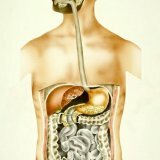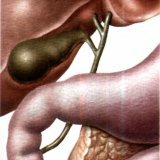Symptoms of a hernia of the esophagus

Beginning familiarization is best with small memories of the course of anatomy. In the human body there is such an important organ as the diaphragm. It is a kind of muscular septum that separates the abdominal and thoracic cavity. There is in the diaphragm, as well a hole formed by muscle beams, through which the esophagus passes. This hole is called the esophageal opening of the diaphragm. That's it about him, and we'll talk, considering the symptoms of a hernia of the esophagus.
Reasons.
The cause of the herniation of the esophagus is the displacement of organs from the abdominal cavity to the thoracic cavity, due to the weakening of the muscles that form the food hole. Suspected of this disease are people of a certain type who are predisposed, or when certain conditions are created, with increased intra-abdominal pressure. An impetus to the development of a hernia can be a constant overeating, excessive weight, constipation, pregnancy, the presence of concomitant diseases of the gastrointestinal tract.
The perisopharyngeal hernia is a displacement of the abdominal cavity organs running parallel to the esophagus, provided that the upper part of the stomach remains unchanged. Depending on the degree of displacement of the abdominal organs into the thoracic cavity, they will distinguish: the base, intestinal, gastrointestinal and omental hernia.
Symptoms.
The first and main symptom in hernia is pain. Often complaints of patients with hernias coincide with complaints with a disease such as reflux-esophagitis. Usually, reflux esophagitis is considered to be a precursor of a hernia of the esophagus, which explains similar symptoms. Pain with a hernia, can sometimes be confused with pain in the "chest toad", so to determine the exact diagnosis it is necessary to undergo radiography. This similarity is explained by the displacement of the abdominal organs into the thoracic cavity, and so the pain sensation often manifests itself in the region of the chest or epigastric region, with a return to the neck or scapula.
Pains, like the symptoms of a hernia in the esophagus, can be of different nature, and can only be manifested in some cases, for example, after eating, with forward tilts or horizontal body position. Especially acute pain is manifested during exercise.
Another true symptom of a hernia of the esophagus is a burp. The eructation can be sour, or bitter, its cause is the ingestion of stomach contents into the esophagus. Perhaps the appearance and heartburn, especially if the patient hernia performs physical work, leans forward or lies, continues to take a large amount of food or alcohol.
Symptoms of a hernia of the esophagus also manifest in the form of dysphagia and manifestations of bleeding. Dysphagia is a disorder of swallowing, usually such a symptom means an exacerbation of the disease, and the possibility of complete obstruction of the esophagus for several days. Bleeding manifests itself mainly in the feces, and its presence will be indicated only by anemia in the patient.
Treat or not treat?
In medical practice, there are many cases where the presence of a hernia does not cause the patient, no discomfort. And usually it is diagnosed accidentally, with a complaint for a completely different disease. Most often, this exception applies to a sliding hernia. In such cases, treatment is not applied, it is simply the patient's need to adhere to a certain lifestyle, which will prevent the formation of increased intra-abdominal pressure.
With pain symptoms and frequent heartburn, treatment is mandatory and urgent. Otherwise, serious complications are possible. Such possible complications include: peptic ulcer of the esophagus, bleeding, narrowing of the esophagus with further scarring of the narrowing site, infringement of the hernia of the food hole, perforation of the esophagus. Usually timely treatment of a hernia is not accompanied by any complications, complications appear if the appropriate course of treatment has not been passed or all the physician's requirements have not been met. Treatment of complications of a hernia is given in most cases by surgical intervention.
How to treat?
The first measure, when signs of a hernia of the esophagus show, should be the elimination of all factors that somehow can lead to this disease. Further treatment is prescribed by a specialist after a complete examination. Also, an integral part of the treatment is a diet. To adhere to the diet is recommended even for patients with sliding hernia, for which drug treatment is not provided. Nutrition of patients is organized in such a way that food is delivered to the body in small portions, but often. With uncomplicated forms of hernia of the esophagus, mandatory therapeutic treatment is included in the course of treatment, to strengthen the abdominal muscles and diaphragm. Operations are resorted only in exceptional cases, when cases are particularly severe, or the disease is started, or there are signs of complications.
For people susceptible to such a disease, treatment and prevention does not end after leaving the hospital walls. To maintain the result, you must follow certain rules at home. Patients with hernia of the esophagus must necessarily be excluded from the daily diet of coffee, chocolate, alcohol, fatty foods, get rid of the habit of smoking, as all these factors contribute to the production of gastric juice, lose weight, stop overeating and limit large physical exertion.



